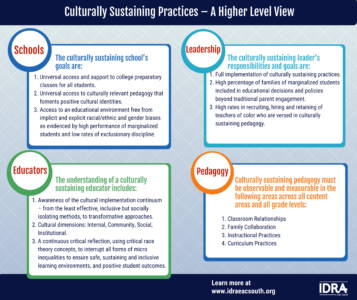• By Paula Johnson, Ph.D., and Hector Bojorquez • IDRA Newsletter • April 2022 •
In our work, particularly through the IDRA EAC-South, IDRA has framed current research around culturally sustaining education into four quadrants that represent practices at the following critical levels: (1) culturally sustaining schools, (2) culturally sustaining leadership, (3) culturally sustaining educators, and (4) culturally sustaining pedagogy.
These four leverage points represent components of the educational ecosystem that can be transformed by culturally sustaining practices to better serve marginalized students of color. Defining what culturally sustaining practices look like in these four levels also aids in identifying data points, situating student outcomes through an equity lens, identifying capacity building needs, and creating spaces for continuous community input and support. Simply, framing leverage points as critical levels gives educational stakeholders a way to quantify steps for successfully implementing culturally sustaining practices.
Culturally Sustaining Schools
Culturally sustaining schools address fundamental equity concerns by holding high expectations for students and providing the highest levels of support for all students to succeed. Success in a culturally sustaining school is defined by preparation for college and career readiness in an environment that is supportive, is asset-conscious and fosters positive cultural identity.
The school also is responsible for placing the histories of all students and families in the context of academic awareness of the contributions, struggles and individual experiences of racial/ethnic groups formerly underrepresented in curriculum and historical narratives.
Ultimately, the culturally sustaining school seeks the highest levels of achievement in an environment that transforms education to recognize that the history, struggles, achievements and contributions of the racially underrepresented populations it serves are fundamental to economic progress, cultural heritage and social dynamics of this country.
Culturally Sustaining Leadership
The culturally sustaining school leader creates policies and coaches faculty to facilitate successful implementation of culturally sustaining instruction.
This leader also sets and monitors standards and expectations for high academic success regardless of perceived performance abilities. This means that the campus leader addresses implicit biases toward racial/ethnic groups. This leader also centers marginalized families and communities as important in decision making, solution-seeking and key to cultural histories.
A culturally sustaining leader does not simply provide a better multicultural education but transforms the educational environment where all students succeed, and their identities are seen as integral to our history, progress and economic future.
Culturally Sustaining Educators
Educators are the first adult faces students see as they walk into an early childhood setting and are important influences throughout their school lives. It is the experiences that educators provide that have the most impact on students and ultimately define the nature of that relationship. And in the case of students of color these experiences must be provided by educators who understand the entirety of students’ experiences.
The research on what educators must provide and what they must understand has grown over the past 30 years. The culturally sustaining educator moves curriculum, pedagogy and practices forward from the least effective multicultural practices of the past to those that center democratic principles and activist practices in the context of marginalized student experiences and their struggles.
Culturally Sustaining Pedagogy
In the spirit of expanding the definition of best teaching practices and pedagogy, this leverage point is based on the Culturally Responsive Instruction Observation Protocol (CRIOP) (Powell, et al., 2017). It provides a framework for identifying observable behaviors of a culturally sustaining education.
It is important to note that, in and of themselves, many of the practices described in the protocol have the possibility of impacting educational practices only if they are situated in the racial and ethnic context of students’ lived experiences. Instructors must explicitly understand that these practices are responses to systemic racism, implicit and explicit biases and power dynamics of underrepresented and oppressed groups.
IDRA recommends the following CRIOP indicators found in the quadrant: classroom relationships, family collaboration, instructional practices and curriculum practices.

Resources
Anderson, R. (2007). Being a Mathematics Learner: Four Faces of Identity. The Mathematics Educator, 17(1).
Banks, J.A., & Banks, C.A. (2012). Multicultural Education: Issues and Perspectives (8th ed.). Wiley Global Education.
Bell, D. (1980). Brown v. Board of Education and the Interest-Convergence Dilemma. Harvard Law Review, 93(3), 518-533. doi:10.2307/1340546
Berry, T., & Candis, M. (2013). Cultural Identity and Education: A Critical Race Perspective. Educational Foundations, 27, 43-4), p.43-64.
Berry, T., & Stovall, D. (2013). Trayvon Martin and the Curriculum of Tragedy: Critical Race Lessons for Education. Race Ethnicity and Education, 16(4), 587-602.
Boaler, J. (2002). Learning from teaching: Exploring the relationship between reform curriculum and equity. Journal for Research in Mathematics Education, 33(4), 239-258.
Cho, S., Crenshaw, K., & McCall, L. (1991). Toward a Field of Intersectionality Studies: Theory, Applications, and Praxis Signs, Vol. 38, No. 4, Intersectionality: Theorizing Power, Empowering Theory (Summer 2013), pp. 785-810
Crenshaw, K. (1991). Mapping the Margins: Intersectionality, Identity Politics, and Violence
Delgado, R. (2014). Storytelling for Oppositionists and Others: A Plea for Narrative. In Delgado, R., & Stefancic, J. (Eds). Critical Race Theory: The Cutting Edge. Philadelphia: Temple University Press.
Delgado, R., & Stefancic, J. (1993). Critical Race Theory: An Annotated Bibliography. Virginia Law Review, 79(2), 461-516. doi:10.2307/1073418
Delgado, R., & Stefancic, J. (2001). Critical Race Theory – An Introduction. NYU Press.
Delpit, L. (2006). Other People’s Children: Cultural Conflict in The Classroom. The New Press.
Delpit, L.D. (2012). “Multiplication is for White People” – Raising Expectations for Other People’s Children. The New Press.
Delpit, L.D., & Ladson-Billings, G. (1996). The Dreamkeepers: Successful Teachers of African American Children. Contemporary Sociology. Jossey-Bass Publishers.
Demoiny, S.B. (2017). Living the Change They Seek: Social Studies Teacher Educators Who Incorporate Race Into the Curriculum (Doctoral dissertation, University of Tennessee).
Dixson, A.D., & Rousseau, C.K. (2006). And We Are Still Not Saved: Critical Race Theory in Education Ten Years Later, Race Ethnicity and Education, 8:1, 7-27, DOI: 10.1080/1361332052000340971
Durant, W.L. (2013). Seeing Through the Eyes of African-American Female Math Teachers: Their Counter-Narratives and How It Influences their Math Identity (Doctoral dissertation, ProQuest).
Egalite, A.J., Kisida, B., & Winters, M.A. (2015). Representation in the classroom: The effect of own-race teachers on student achievement. Economics of Education Review, 45, 44-52.
Gay, G. (2003). Deracialization in Social Studies Teacher Education Textbooks. Critical race theory perspectives on social studies, 123-148.
Gay, G. (2018). Culturally Responsive Teaching: Theory, Research, and Practice. Teachers College Press.
Grant, C.A., & Sleeter, C.E. (1986). Race, Class, and Gender in Education Research: An Argument for Integrative Analysis. Review of Educational Research, 56(2), 195-211.
Gutiérrez, R. (2013). The Sociopolitical Turn in Mathematics Education. Journal for Research in Mathematics Education, 44(1), 37-68.
Gutstein, E., Fey, J.T., Heid, M.K., Deloach-Johnson, I., Middleton, J.A., Larson, M., Dougherty, B., Tunis, H. (2005). Equity in School Mathematics Education: How Can Research Contribute? Journal for Research in Mathematics Education, 36(2), 92-100.
Hill, C., Corbett, C., & St. Rose, A. (2010). Why So Few? AAUW.
Joseph, N.M., Hailu, M., & Boston, D. (2017). Black Women’s and Girls’ Persistence in the P–20 Mathematics Pipeline: Two Decades of Children, Youth, and Adult Education Research. Review of Research in Education, 41(March), 203-227. https://doi.org/10.3102/0091732X16689045
Kanny, M.A., Sax, L.J., & Riggers-Piehl, T.A. (2014). Investigating Forty Years of STEM Research: How Explanations for the Gender Gap Have Evolved Over Time. Journal of Women and Minorities in Science and Engineering, 20(2), 127-148.
Kolo, Y.I. (2016). Experiences of African American Young Women in Science, Technology, Engineering, and Mathematics (STEM) Education (Doctoral dissertation, Walden University).
Ladson-Billings, G. (1995). Toward a Theory of Culturally Relevant Pedagogy. American Educational Research Journal, 32(3), 465-491.
Ladson-Billings, G. (Ed.). (2003). Critical Race Theory Perspectives on The Social Studies: The Profession, Policies, and Curriculum. IAP.
Ladson-Billings, G., & Tate IV, W. (1995). Toward a Critical Race Theory of Education. Teachers College Record, 97(1), 47-68.
Levinson, B.A., Gross, J.P.K., & Hanks, C. (2011). Beyond Critique: Exploring Critical Social Theories and Education. Florence: Taylor and Francis.
Loewen, J.W. (1995). Lies My Teacher Told Me: Everything Your American History Textbook Got Wrong. New York: New Press.
Lynn, M., Yosso, T.J., Solórzano, D.G., & Parker, L. (2002). Critical Race Theory and Education: Qualitative Research in the New Millennium. Qualitative Inquiry, 8(1), 3-6.
MacKinnon, C.A. (2013). Intersectionality as Method: A Note. Signs: Journal of Women in Culture and Society, 38(4), 1019-1031.
Malo-Juvera, V., & Correll, P. (2016). Operationalizing Culturally Responsive Instruction: Preliminary Findings of CRIOP Research. Powell, Rebecca; Cantrell, Susan Chambers. Teachers College Record, v118 n1
Martin, D.B. (2012). Learning Mathematics While Black. Educational Foundations, (winter/spring), 4766.
McGee, E.O. (2015). Robust and Fragile Mathematical Identities: A Framework for Exploring Racialized Experiences and High Achievement Among Black College Students. Journal for Research in Mathematics Education, 46(5), 599-625.
Oates, G.L.S.C. (2003). Teacher-Student Racial Congruence, Teacher Perceptions, and Test Performance. Social Science Quarterly, 84(3), 508-525.
Paris, D., & Alim, H.S. (2014). What Are We Seeking to Sustain Through Culturally Sustaining Pedagogy? A Loving Critique Forward. Harvard Business Review, 81(1), 85-137.
Powell, R., Cantrell, S.C., Correll, P.K., & Malo-Juvera, V. (2017). Culturally Responsive Instruction Observation Protocol (4th ed.). Lexington, Ken.: University of Kentucky College of Education.
Stairs, A.J. & Donnell, K.A., & Dunn, A.H. (2012). Theory, Research, and Practice in K-12 Classrooms. 10.4135/9781452244013.
Struchens, M.E., Johnson, M.L., & Tate, W.F. (2000). Changing the Faces of Mathematics: Perspectives on African Americans. National Council of Teachers of Mathematics.
Tang, H., Chen, B., & Zhang, W. (2010). Gender Issues in Mathematical Textbooks of Primary Schools. Journal of Mathematics Education, 3(2), 106-114.
Walker, E.N. (2015). Beyond Banneker: Black Mathematicians and the Paths to Excellence. Suny Press.
Wing, A.K. (1990). Brief Reflections Toward a Multiplicative Theory and Praxis Of Being. Berkeley Women’s LJ, 6, 181.
Wing, A.K. (1997a). Brief Reflections Toward a Multiplicative Theory and Praxis of Being. In A.K. Wing (Ed.), Critical Race Feminism: A Reader (pp. 27-34). New York, N.Y.: New York University Press.
Wing, A.K. (Ed.). (1997b). Critical Race Feminism: A Reader. New York, N.Y.: New York University Press.
Zinn, H. (1990). A People’s History of the United States. New York: Harper & Row.
Paula N. Johnson, Ph.D., is an IDRA senior education associate and director of the IDRA EAC-South. Comments and questions may be directed to her via email at paula.johnson@idra.org. Hector Bojorquez is IDRA’s director of operations and educational practice. Comments and questions may be directed to him via email at hector.bojorquez@idra.org.
[©2022, IDRA. This article originally appeared in the April 2022 IDRA Newsletter by the Intercultural Development Research Association. Permission to reproduce this article is granted provided the article is reprinted in its entirety and proper credit is given to IDRA and the author.]



